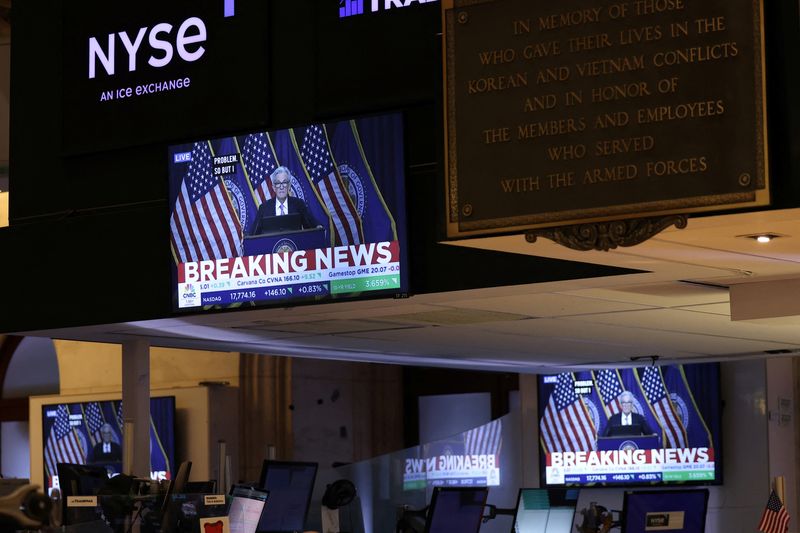By Alden Bentley
(Reuters) - A look at the day ahead in Asian markets.
An uptick in U.S. consumer price inflation last month that was in line with forecasts propped up Wall Street indexes on Wednesday, and lifted the dollar close to levels against the yen that had been concerning to the Bank of Japan.
The CPI report, especially an increase in the 12-month rate, hardened thinking that while the Fed had justification to ease another 25 basis points at its December meeting, 2025 could see it rethink the pace of easing if inflation readings keep moving in the wrong direction. After all, it has approved a full percentage point of reductions since September.
Markets could get insight into how the Fed will process October's fourth straight 0.2% CPI increase -- and the year-on-year inflation rise to 2.6% from 2.4% in September -- when Fed Chair Jerome Powell delivers a speech on the economic outlook on Thursday at 3:00 p.m. EST (1700 GMT), which will be followed by a question and answer session.
By then, the Fed chief will have also had time to digest the October producer prices report that comes out on Thursday morning and feeds more directly into the central bank's preferred inflation indicator, the personal consumption expenditures price index that arrives later in the month.
Meanwhile, bitcoin vaulted above $93,000 and crypto currencies still looked like the trade of the week, continuing to outshine other asset classes.
U.S. President-elect Donald Trump embraced digital assets during his campaign, promising to make the United States the "crypto capital of the planet" and to accumulate a national stockpile of bitcoin.
It was last up 4.08% at $91,910, marking a 32% rise since the Nov. 5 election. Smaller peer ether has risen 37% since election day, while dogecoin, an alternative, volatile token promoted by billionaire Trump-ally Elon Musk was up more than 150%.
The dollar rose to 155.62 yen, its highest since July 24 and a level that many market participants consider a trigger point for verbal intervention by Japanese authorities.
At this point it looks like prospects for the Fed to ease up on its easing is a more prominent factor than whatever the timetable will be for the Bank of Japan's decision to hike rates. A jump in Japan's October wholesale inflation reported Wednesday does not make that call any easier.
Until recently Japan faced a greater risk of deflation than inflation. The BOJ ended negative rates in March and its Governor Kazuo Ueda has stressed it is ready to raise them again, having last done so in July because of inflation and the risk of a weak yen.
The euro fell to its lowest in almost a year against the dollar, and euro/yen was almost flat at 164.33.
Senior U.S. officials said on Wednesday that U.S. President Joe Biden will meet Chinese counterpart Xi Jinping in Peru for likely the final time on Saturday, as Beijing prepares for a potentially more confrontational period with Washington under Trump.
Worries of Trump stacking his administration with China hardliners like Florida Senator Marco Rubio - who has now been tapped to become secretary of state, and Representative Mike Waltz - who was picked for national security adviser - have weighed on Chinese markets, although the blue chip CSI 300 and Shanghai Composite managed firmer closes on Wednesday.
The offshore yuan CNH= was little changed at 7.243 per dollar, after the People's Bank of China pulled the currency off a three-month low versus the dollar by setting a firmer-than-expected official guidance for the exchange rate, signaling growing discomfort over the currency's recent rapid decline.
Here are key developments that could provide more direction to markets on Thursday:
- New Zealand Manufacturing PMI (Oct)
- Japan GDP (Q3)
- China industrial output (Oct)
- Indonesia trade balance (Oct)

- US Producer Price Index (Oct)
- Fed Chairman Powell's speech